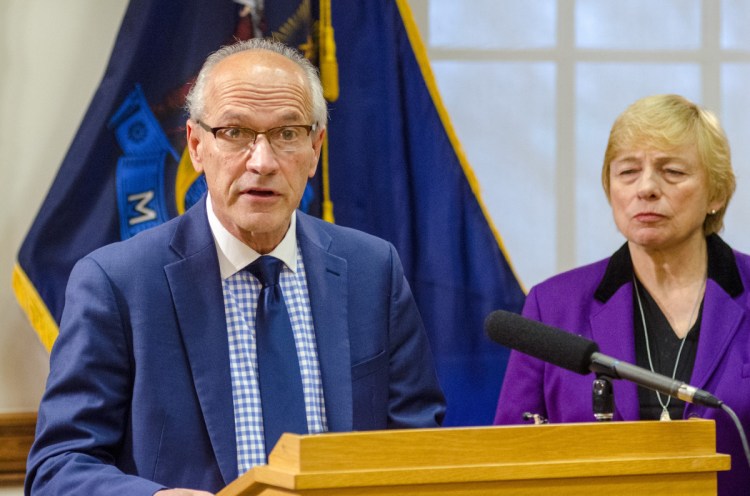AUGUSTA — Maine Gov. Janet Mills on Thursday appointed longtime Maine Medical Association Executive Vice President Gordon Smith as the state’s first director of opioid response.
Smith will be Mills’ point person for coordinating interagency efforts to address Maine’s opioid crisis, which continues to claim an average of more than one life every day.
The creation of a new position mirrors what other states already have done and is likely the first in a series of policy announcements by Mills, who has made tackling the epidemic one of her top priorities.
“History will note that we have lost an entire generation of people to the opioid epidemic and that we have simply failed to address this preventable disease,” the governor said at Thursday’s announcement in her Cabinet Room. “It is time to mobilize state government to stem the tide of this deadly epidemic. I have said that, as governor, I’d make sure there was someone whose sole responsibility would be to flesh out what is working and what is not, to draft a blueprint for change and to report to me every day, every week about our progress.”
‘EXECUTIVE LEADERSHIP HELPS’
The annual report that details how many Mainers died from overdose last year is still weeks from completion, but Mills said the total is likely to be slightly lower than the 2017 total of 418 deaths. Still, that total set a record for the fourth consecutive year and was more than double the number of overdose deaths in 2014.
Smith, 67, is well-known in Augusta, having been a lobbyist for the association that represents doctors for 25 years.
Like Mills, he has served on recent statewide opioid task forces and has been involved in discussions about legislation in recent sessions. Mills called him an “experienced, well-respected, highly qualified public health expert.”
Smith said he was humbled for the opportunity to serve in the Mills administration. He also said Maine has a long way to go.
“The opioid epidemic continues to take a horrific toll on our state,” he said. “And while there’s some indication that the situation is improving, Maine has not fared as well as other New England states, in part because our state response has been rather anemic.”
Smith went a step further in criticizing the prior administration, without mentioning former Republican Gov. Paul LePage by name.
“Executive leadership helps,” he said. “We’ve not had a situation here in recent years where the executive leadership for the state has been saying things that Governor Mills is saying – that this is a chronic illness, that these are our sons and daughters and they need to be loved and treated and it’s OK to bring them back to life three, four times. Maybe the fifth time is when they’ll get into treatment.”
REPUBLICANS CONCERNED
LePage often was reluctant to embrace medication-assisted treatment and to expand access to the overdose-reversing drug Narcan. His efforts focused on law enforcement and attacking the supply side.
A statement about Smith’s appointment from Maine Senate Republicans voiced a note of caution about Mills’ early efforts to address the crisis.
“We agree that there needs to be a coordinated response between agencies, however we remain concerned about where the funding for the new departments and positions being named under the current administration will come from,” the statement said. “Maine taxpayers already pay more than their fair share, so we need to spend our limited resources wisely.”
As states across the country have mobilized to address the opioid crisis, some have started to see results while Maine has been stagnant.
A report released late last year by the U.S. Centers for Disease Control and Prevention ranked states which had the biggest increase in overdose deaths from 2016 to 2017. Maine ranked seventh with an increase of 20 percent, while other New England states saw much smaller increases. New Hampshire and Massachusetts actually saw decreases.
MILLS: ‘YOU ARE NOT ALONE’
Smith said Maine has made strides in reducing the number of opioid prescriptions, “But in almost every other category, we are behind other states.”
Smith will work out of the governor’s Office of Innovation and the Future, a newly established agency that took the place of the governor’s planning office. Although Smith didn’t reveal too many specifics, he said treatment would be a major focus.
“The medical community is fully on board that the gold standard is medication-assisted treatment,” he said, referring to the use of methadone or Suboxone in combination with counseling. “The problem is that not all aspects of the population are on board with that.”
As an example, he said that only a few of the recovery residences in Greater Portland will take patients on medication-assisted treatment.
Mills said her office would issue a detailed executive order “directing the specific steps we will take to address this crisis,” in the coming weeks. In the meantime, she reiterated Thursday that people who are suffering from substance use disorder should come out of the shadows.
“I speak to them today and to their loved ones,” the governor said. “We see you, we hear you, we know who you are. You are not alone. You have my word, wherever you are, we will do everything in our power to bring you back, to make our communities whole once again.”
Eric Russell can be contacted at 791-6344 or at:
Twitter: PPHEricRussell
Send questions/comments to the editors.


